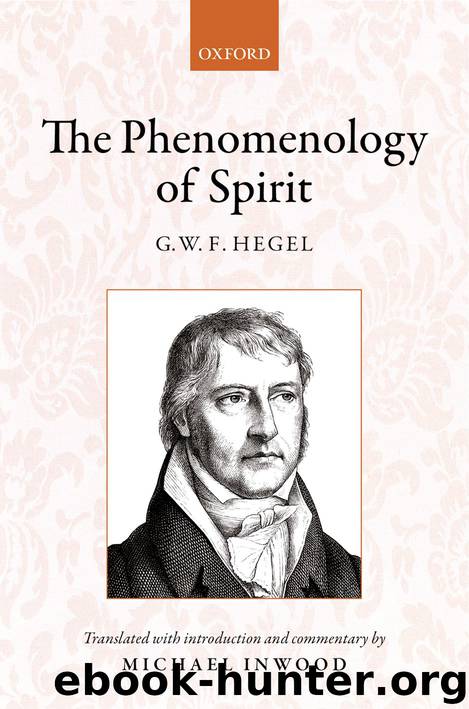Hegel by Michael Inwood

Author:Michael Inwood
Language: eng
Format: epub
Publisher: Oxford University Press
Published: 2018-02-09T05:00:00+00:00
(CC.) Religion
VII. Religion
¶672. In the configurations so far, which are distinguished broadly as consciousness, self-consciousness, reason, and spirit, religion too as consciousness of the absolute essence in general, has indeed occurred,—but only from the standpoint of the consciousness that is conscious of the absolute essence; but the absolute essence in and for itself, the self-consciousness of spirit, has not appeared in those forms.1
¶673. Even consciousness, insofar as it is understanding, becomes consciousness of the supersensible or the interior of objective Being-there. But the supersensible, the eternal, or whatever else we may call it, is self-less; to begin with it is only the universal, which is still far from being the spirit that knows itself as spirit.—And then self-consciousness, which reaches its completion in the shape of unhappy consciousness, was only the pain of the spirit fighting its way towards objectivity again, but failing to reach it. The unity of the singular self-consciousness and its changeless essence, a unity towards which self-consciousness proceeds, therefore remains a Beyond for it. The immediate Being-there of reason, which emerged for us from that pain, and its peculiar shapes, involve no religion, because their self-consciousness knows or seeks itself in the immediate present.1
¶674. On the other hand, in the ethical world we did see a religion, namely, the religion of the underworld; it is the belief in the terrible, unknown night of fate and in the Eumenides of the departed spirit: the former is pure negativity in the form of universality, the latter the same negativity in the form of singularity. So in the latter form the absolute essence is in fact the Self, and present, since the Self cannot be other than present; but the singular Self is this singular shade which has separated from itself the universality which is fate. It is indeed a shade, a sublated This, and thus a universal Self; but its negative meaning has not yet turned into this positive meaning, and therefore the sublated Self still immediately signifies this particular and essenceless entity as well. But fate without the Self remains the unconscious night which does not attain to differentiation within itself, nor to the clarity of self-knowledge.1
¶675. This belief in the nothing of necessity and in the underworld becomes belief in heaven, because the departed Self must unite with its universality, display what it contains within this universality, and so become clear to itself. But we saw this realm of faith unfold its content only in the element of thinking without the concept, and consequently perish in its fate, namely, in the religion of enlightenment. In this religion, the supersensible beyond of the understanding is restored, but in such a way that self-consciousness remains satisfied in this world and knows the supersensible beyond—the empty, impenetrable and innocuous beyond—neither as Self nor as power.1
¶676. In the religion of morality, the absolute essence finally has a positive content restored to it; but this content is combined with the negativity of the enlightenment. It is a Being that is at
Download
This site does not store any files on its server. We only index and link to content provided by other sites. Please contact the content providers to delete copyright contents if any and email us, we'll remove relevant links or contents immediately.
| Anthropology | Archaeology |
| Philosophy | Politics & Government |
| Social Sciences | Sociology |
| Women's Studies |
The remains of the day by Kazuo Ishiguro(8999)
Tools of Titans by Timothy Ferriss(8394)
Giovanni's Room by James Baldwin(7346)
The Black Swan by Nassim Nicholas Taleb(7129)
Inner Engineering: A Yogi's Guide to Joy by Sadhguru(6794)
The Way of Zen by Alan W. Watts(6614)
The Power of Now: A Guide to Spiritual Enlightenment by Eckhart Tolle(5781)
Asking the Right Questions: A Guide to Critical Thinking by M. Neil Browne & Stuart M. Keeley(5775)
The Six Wives Of Henry VIII (WOMEN IN HISTORY) by Fraser Antonia(5515)
Astrophysics for People in a Hurry by Neil DeGrasse Tyson(5189)
Housekeeping by Marilynne Robinson(4447)
12 Rules for Life by Jordan B. Peterson(4304)
Ikigai by Héctor García & Francesc Miralles(4274)
Double Down (Diary of a Wimpy Kid Book 11) by Jeff Kinney(4271)
The Ethical Slut by Janet W. Hardy(4251)
Skin in the Game by Nassim Nicholas Taleb(4248)
The Art of Happiness by The Dalai Lama(4130)
Skin in the Game: Hidden Asymmetries in Daily Life by Nassim Nicholas Taleb(4006)
Walking by Henry David Thoreau(3962)
